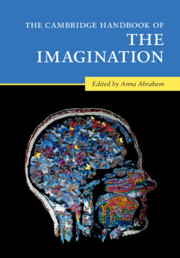Book contents
- The Cambridge Handbook of the Imagination
- The Cambridge Handbook of the Imagination
- Copyright page
- Dedication
- Contents
- Figures
- Contributors
- Acknowledgments
- 1 Surveying the Imagination Landscape
- Part I Theoretical Perspectives on the Imagination
- Part II Imagery-Based Forms of the Imagination
- Part III Intentionality-Based Forms of the Imagination
- Part IV Novel Combinatorial Forms of the Imagination
- Part V Phenomenology-Based Forms of the Imagination
- Part VI Altered States of the Imagination
- 40 Dreaming: Beyond Imagination and Perception
- 41 Dreaming is Imagination Roaming Freely, Based On Embodied Simulation, and Subserved by an Unconstrained Default Network
- 42 Aphantasia
- 43 Hypnosis and Imagination
- 44 Hallucinations and Imagination
- 45 The Psychiatry of Imagination
- 46 Meditation and Imagination
- 47 Flow in Performance and Creative Cognition – An Optimal State of Task-Based Adaptation
- 48 The Force of the Imagination
- Name Index
- Subject Index
- References
43 - Hypnosis and Imagination
from Part VI - Altered States of the Imagination
Published online by Cambridge University Press: 26 May 2020
- The Cambridge Handbook of the Imagination
- The Cambridge Handbook of the Imagination
- Copyright page
- Dedication
- Contents
- Figures
- Contributors
- Acknowledgments
- 1 Surveying the Imagination Landscape
- Part I Theoretical Perspectives on the Imagination
- Part II Imagery-Based Forms of the Imagination
- Part III Intentionality-Based Forms of the Imagination
- Part IV Novel Combinatorial Forms of the Imagination
- Part V Phenomenology-Based Forms of the Imagination
- Part VI Altered States of the Imagination
- 40 Dreaming: Beyond Imagination and Perception
- 41 Dreaming is Imagination Roaming Freely, Based On Embodied Simulation, and Subserved by an Unconstrained Default Network
- 42 Aphantasia
- 43 Hypnosis and Imagination
- 44 Hallucinations and Imagination
- 45 The Psychiatry of Imagination
- 46 Meditation and Imagination
- 47 Flow in Performance and Creative Cognition – An Optimal State of Task-Based Adaptation
- 48 The Force of the Imagination
- Name Index
- Subject Index
- References
Summary
Hypnosis involves the use of verbal suggestion to modulate behavior and experience. Hypnosis and imagination have long been associated and the view that hypnotic suggestion effects changes in experience through imagination is a persistent one. In this review, we first present a brief overview of hypnosis and then turn to its potential relationship to imagery and imagination. We consider whether individual differences in imagination may relate to hypnotic suggestibility and the extent to which imagery is recruited during response to hypnotic suggestions in psychological and neuroimaging studies. Finally, we briefly consider the roles of imagery and suggestion in clinical applications of hypnosis. We conclude that while hypnotic suggestibility may relate to variability in imagination, hypnotic suggestion and voluntary forms of imagery are subserved by dissimilar neurocognitive mechanisms.
- Type
- Chapter
- Information
- The Cambridge Handbook of the Imagination , pp. 711 - 727Publisher: Cambridge University PressPrint publication year: 2020
References
- 12
- Cited by

